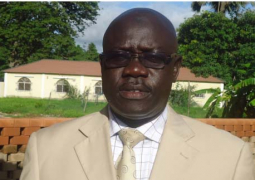With just about 18 months to go in the countdown towards the 2015 deadline for the UN Millennium Development Goals (MDGs), the Reproductive and Child Health Unit (RCH) of the ministry of Health in Banjul is making last minute strides to improve the country’s ranking in relation to child mortality and maternal deaths,which are related to goals 4 and 5 respectively.
On Wednesday 4th June, the Lower River Regional Health Directorate hosted a one-day advocacy programme by the RCH for regional and district authorities in the crusade to increase the maternal and child health status of the region.
“Child mortality and maternal death rates are high”, said Momodou Darboe, principal nursing officer at the RCH. As a result, he added, it was not too late to send a reminder to district chiefs, village heads, ward councillors and the regional governor to intensify the campaign on preventive and curative measures in all households.
In his presentation, Juma Jallow, regional principal nursing officer, described maternal deaths as a big problem in developing countries. In the Gambia, he said, most deaths are due to hemorrhage and hypertensive disorders. “Anemia also contributes to high maternal deaths”, he continued, adding that “most obstetric conditions are hypertensive disorders, rising abortion cases, and delay in labour.”
Mr Jallow said issues like late antenatal booking by pregnant women, low involvement of men in reproductive health issues and family members refusing to donate blood to their own relatives during emergencies, are serious challenges in the race towards the MDGs.
Fatou Camara senior programme officer, Regional and Child Health Unit, said despite the statistics on progress towards the two MDGs, the country has done well compared to other sub Saharan African countries.
However, she added, unlike in the developed world where a woman’s life-time risk of dying during pregnancy and child-birth is low, the risk of maternal death is very high.
Lower River Region Governor Salieu Puye praised the health workers in his region for the progress they managed to register towards the MDGs.
He said from September 2000 to date it has been a long journey, and it was still not late for the community to double efforts for positive attitudinal changes regarding early marriage and failure to visit a health facility in time during a pregnancy.
Puye recommended the inclusion of some reliable traditional medicines as alternative means to care for pregnant women. He also encouraged men to improve their involvement in reproductive health issues, and for everyone to be willing to donate blood whenever necessary.



